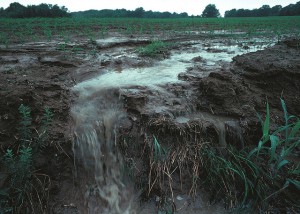Organic farming methods reduce water pollution
A recent study published in Sustainable Agriculture Research has found that organic farming methods can be used to reduce water pollution in U.S waterways. The leaching of nitrate from farming soil into water drainage systems is a major source of water pollution in the upper Midwestern states. In attempt to reduce the environmental impacts associated with heavy fertilizer use in conventional agriculture, some producers have begun to investigate organic methods. To determine the true impact organic farming practices have on water quality, USDA initiated a long-term study in 2011. For three years, data were collected to compare nitrate pollution from plots with organic and conventional crop rotations as well as organic pastureland. Researchers found that nitrate loss via water in the conventional cropping systems was twice as high as nitrate loss from the organic cropping system, and that the organic pasture system lost the least amount of nitrate. “Results of this study suggest that organic farming practices such as the application of composted animal manure and the use of forage legumes and green manures with extended cropping rotations, can improve water quality in Midwestern subsurface-drained landscapes,” the authors concluded.



